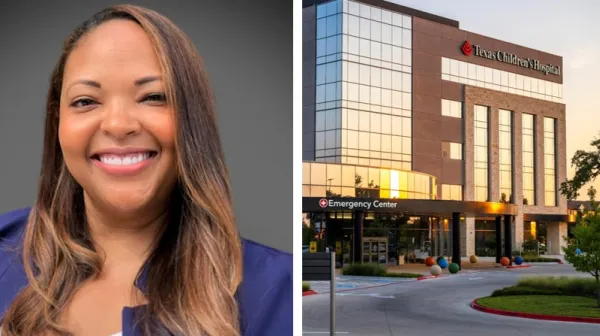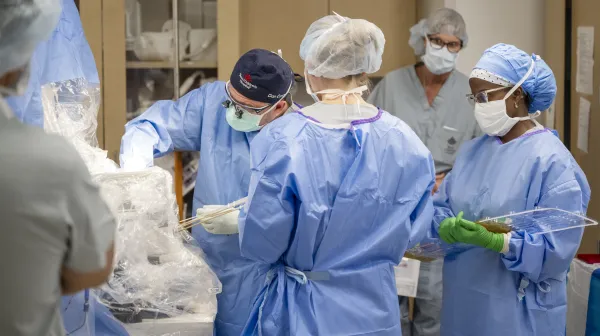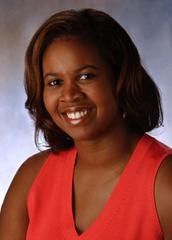
Dr. Desiree Evans is a leader in the fight against health disparities. Her work is celebrated in recognition of National Minority Health Month. Every April, the U.S. Department of Health and Human Services observes National Minority Health Month to highlight the importance of improving the health of racial and ethnic minority communities.
It’s no secret that health disparities exist.
Depending on your racial, social or economic background, there are preventable differences in the rate of disease, injury and opportunities to achieve optimal health. But at Texas Children’s Pediatrics, Dr. Desiree Evans wants to change that.
World-class care where it’s needed most
Dr. Evans, a physician at Texas Children’s Pediatrics (TCP) Palm Center, is a champion and advocate on behalf of families whose health and well-being are affected by these challenges.
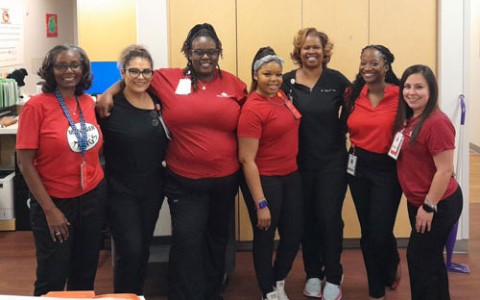
The Palm Center practice is one of eight Community Cares TCP offices located in underserved areas. These practices offer extended hours to accommodate working-class parents and provide a multitude of resources — such as free Lyft rides if you don’t have transportation to your appointments.
“Every child deserves great health care,” Dr. Evans said. “Even if their family can’t pay or doesn’t have all of the necessary resources, they are still deserving of the best care possible, and that’s what we provide.”
A big part of providing that care is addressing any unmet needs beyond the day’s visit. “During our visits, we ask questions about the child’s entire life,” Dr. Evans said. “We ask if there is enough food at home, how he or she is doing at school, how mom is doing, dad is doing and grandma — because the condition and dynamics of the entire family impact a child’s wellness.”
To address these and other issues that may surface during these discussions, TCP Community Cares practices are staffed with social workers who help families gain access to the best resources.
Destined for this work
Dr. Evans is a native of New Orleans, Louisiana, and was raised for many years in the Fischer Housing Projects, a low-income housing development that was once notorious for high crime.
Her mother and father were first-generation college students who were dedicated to bettering themselves and giving back. “I was taught that to whom much is given, much is expected,” she said, referencing Luke 12:48, a popular biblical scripture. “That is the way my parents lived their lives and how they taught me to live mine.”
In addition to this expectation, she recalled spending a lot of time in hospitals when she was younger.
“My grandmother had a chronic illness and so I was constantly at the hospital in the presence of physicians. I would see them talking to patients, talking to families and solving problems. From a very young age, I started saying that I wanted to be a doctor.”
Dr. Evans began her studies at Xavier University and continued at Tulane Medical School. She completed her pediatrics residency at Baylor College of Medicine, the medical school partner for Texas Children’s Hospital, which sealed her fate — and desire — to serve Houston area families.
Measuring success
But after all these years, the million-dollar question remains … “When it comes to working on health disparities, how do we measure success?”
And although the answers are difficult, the 21-year veteran of Texas Children’s Hospital never shies away from answering.
“Succeeding is what we do on a day-to-day basis,” she said. “For example, let’s take the issue of patients being uninsured or underinsured. Our social workers are required and trained to research the insurance plans that patients qualify for and secure those benefits for them. So that knocks down the uninsured/underinsured access barrier.”
A second example Dr. Evans gave is that TCP Community Cares practices are staffed by physicians who care enough about the community to want to work there. “We could work anywhere else, but we choose to be here. And when you choose to be somewhere, that means you care about what you do and how you do it. So that knocks down the lack of quality care barrier.”
And then when it comes to the overwhelming post-pandemic need for mental health care, Texas Children’s Pediatrics also provides specialized mental and behavioral health services to all patients.
“So just with those three examples, you can see how we are knocking down the barriers one brick at a time,” she said.
She went on to add that attacking the problem brick by brick is only part of the solution. “We also need to create more problem solvers. It’s important that we inspire a racially diverse group of young people to pursue medicine as a career. This way there is a diversity of physicians who are invested in the outcomes of their diverse patient populations.”
Inspiration in action
Dr. Evans’ plan to provide both care and inspiration is well at work when talking to the Williams family of Pearland, Texas – a suburb of Houston. Jessica Williams and her husband, Bobby, are parents to three daughters who are all patients of Dr. Evans.
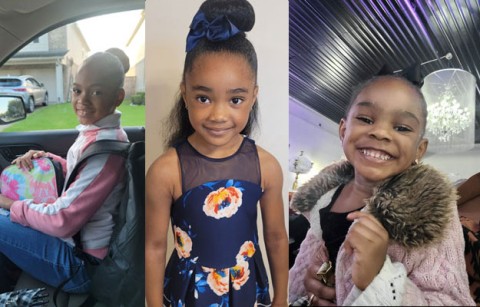
Peyton, 10, Logan, 7, and Charley, 4, undergo treatment for varying health concerns, but Jessica said she knows that all of her girls are in good hands.
“When we first started seeing Dr. Evans, we lived around the corner from her office,” Jessica said. “A few years later we moved to Friendswood, which was more than a 45-minute drive away. But the distance didn’t matter to me. I continued to come to Palm Center so that Dr. Evans could take care of my girls.”
The Williams family now lives in Pearland, which is a little closer than Friendswood. However, Jessica said that where they live is no longer part of the discussion. “I don’t care if we moved to The Woodlands one day, I would still drive the hour and a half to come to see Dr. Evans.”
When the mother of three tells the story of her children’s health conditions, the list includes Logan’s eczema and acid reflux, as well as Charley’s autism. She takes a little more time to tell the harrowing story of her daughter Peyton’s emergency brain surgery earlier this year after two years of battling seizures.
Following Peyton’s emergency surgery, she was diagnosed with arteriovenous malformation, a condition characterized by tangled blood vessels in the brain. Her surgery was a success, but she will need another operation soon.
“Dr. Evans was there every step of the way to help us with her follow-up care and anything else that we needed to return our daughter to a normal life, including having meetings with school administrators and helping with her home-schooling,” Jessica said. “I cannot say enough good things about how she has taken care of my daughters, and I have no doubt she treats all of her patients the same way.”
The Williams’ middle child, Logan, said because of Dr. Evans she is more than inspired. She now has a blueprint for her future. “Dr. Evans is amazing, intelligent, and takes really good care of us. When I grow up, I want to be a doctor — just like Dr. Evans.”




